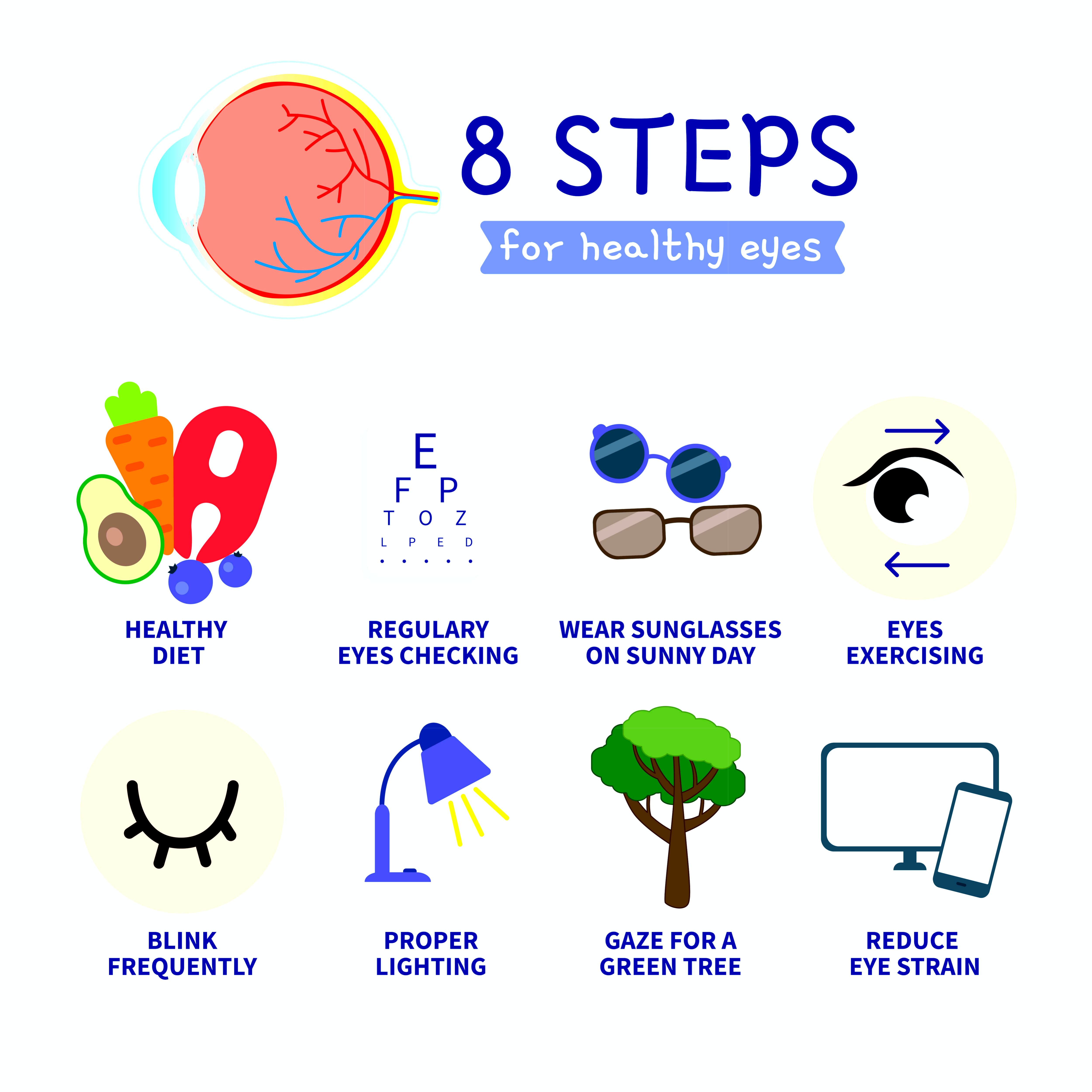Featured
Healthy and balanced vision is a cornerstone of high quality of life, yet several people undervalue the relevance of nourishment in preserving eye health and wellness. A diet regimen abundant in particular nutrients can safeguard your eyes, lower the threat of establishing common eye illness, and assistance total ocular function. Let's check out just how nourishment influences your eyesight and the key nutrients you should include in your everyday dishes.
Crucial Nutrients for Eye Health And Wellness
Vitamin A. Recognized for its duty in protecting vision, vitamin A is essential for keeping a healthy cornea and making it possible for low-light vision. Shortage in vitamin A can cause night blindness and other serious eye conditions. Exceptional resources consist of carrots, sweet potatoes, and dark leafy eco-friendlies.
Lutein and Zeaxanthin. Found in high focus in the retina, these anti-oxidants shield versus damages triggered by blue light and oxidative tension. Consuming foods like spinach, kale, broccoli, and eggs can aid maintain your eyes healthy.
Omega-3 Fatty Acids. Omega-3s are important for the health and wellness of the retina and can help in reducing signs and symptoms of dry eye disorder. Consist of fatty fish such as salmon, tuna, and mackerel in your diet plan, or decide for plant-based resources like chia seeds and walnuts.
Vitamin C. A powerful anti-oxidant, vitamin C supports the health and wellness of blood vessels in the eyes and might reduce the risk of cataracts. Foods abundant in vitamin C include oranges, strawberries, bell peppers, and tomatoes.
Vitamin E. This nutrient protects eye cells from oxidative damage. Integrate almonds, sunflower seeds, and avocados into your meals to enhance vitamin E levels.
Zinc. Zinc plays a key duty in delivering vitamin A from the liver to the retina, helping in the manufacturing of melanin, a protective pigment in the eyes. Foods such as oysters, beef, and fortified grains are outstanding sources.
![]()
Avoiding Eye Conditions Via Diet Regimen
Macular Degeneration: Anti-oxidants like lutein, zeaxanthin, and vitamins C and E can help slow down the development of age-related macular degeneration (AMD)
Cataracts: Ample consumption of vitamin C and various other anti-oxidants may avoid or postpone the onset of cataracts.
![]()
Dry Eyes: Omega-3 fatty acids aid enhance tear quality and reduce dry eye signs.
Diabetic Retinopathy: A diet regimen reduced in refined sugars and rich in entire foods can aid handle blood sugar level degrees, decreasing the risk of this condition in individuals with diabetic issues.
Practical Nourishment Tips
Expand Your Diet: Include a selection of fruits, veggies, lean proteins, and whole grains to guarantee you're obtaining a large range of nutrients.
Restriction Processed Foods: Minimize intake of sugarcoated and harmful fats, which can add to systemic wellness issues impacting your eyes.
Keep Hydrated: Correct hydration sustains tear manufacturing and avoids eye dryness.
Take Into Consideration Supplements: If your diet regimen lacks particular nutrients, get in touch with a medical care company regarding taking supplements for better eye health and wellness.
Conclusion
![]()
Great nourishment is a vital element of preserving optimum eye health and wellness. By including nutrient-dense foods into your diet regimen, you can lower the danger of eye conditions and shield your vision for the long-term. Making informed dietary choices today can protect your vision for years to come. An appointment with a nutritionist or health care expert can provide individualized assistance customized to your demands. if you're unsure where to start.
Crucial Nutrients for Eye Health And Wellness
Vitamin A. Recognized for its duty in protecting vision, vitamin A is essential for keeping a healthy cornea and making it possible for low-light vision. Shortage in vitamin A can cause night blindness and other serious eye conditions. Exceptional resources consist of carrots, sweet potatoes, and dark leafy eco-friendlies.
Lutein and Zeaxanthin. Found in high focus in the retina, these anti-oxidants shield versus damages triggered by blue light and oxidative tension. Consuming foods like spinach, kale, broccoli, and eggs can aid maintain your eyes healthy.
Omega-3 Fatty Acids. Omega-3s are important for the health and wellness of the retina and can help in reducing signs and symptoms of dry eye disorder. Consist of fatty fish such as salmon, tuna, and mackerel in your diet plan, or decide for plant-based resources like chia seeds and walnuts.
Vitamin C. A powerful anti-oxidant, vitamin C supports the health and wellness of blood vessels in the eyes and might reduce the risk of cataracts. Foods abundant in vitamin C include oranges, strawberries, bell peppers, and tomatoes.
Vitamin E. This nutrient protects eye cells from oxidative damage. Integrate almonds, sunflower seeds, and avocados into your meals to enhance vitamin E levels.
Zinc. Zinc plays a key duty in delivering vitamin A from the liver to the retina, helping in the manufacturing of melanin, a protective pigment in the eyes. Foods such as oysters, beef, and fortified grains are outstanding sources.

Avoiding Eye Conditions Via Diet Regimen
Macular Degeneration: Anti-oxidants like lutein, zeaxanthin, and vitamins C and E can help slow down the development of age-related macular degeneration (AMD)
Cataracts: Ample consumption of vitamin C and various other anti-oxidants may avoid or postpone the onset of cataracts.

Dry Eyes: Omega-3 fatty acids aid enhance tear quality and reduce dry eye signs.
Diabetic Retinopathy: A diet regimen reduced in refined sugars and rich in entire foods can aid handle blood sugar level degrees, decreasing the risk of this condition in individuals with diabetic issues.
Practical Nourishment Tips
Expand Your Diet: Include a selection of fruits, veggies, lean proteins, and whole grains to guarantee you're obtaining a large range of nutrients.
Restriction Processed Foods: Minimize intake of sugarcoated and harmful fats, which can add to systemic wellness issues impacting your eyes.
Keep Hydrated: Correct hydration sustains tear manufacturing and avoids eye dryness.
Take Into Consideration Supplements: If your diet regimen lacks particular nutrients, get in touch with a medical care company regarding taking supplements for better eye health and wellness.
Conclusion

Great nourishment is a vital element of preserving optimum eye health and wellness. By including nutrient-dense foods into your diet regimen, you can lower the danger of eye conditions and shield your vision for the long-term. Making informed dietary choices today can protect your vision for years to come. An appointment with a nutritionist or health care expert can provide individualized assistance customized to your demands. if you're unsure where to start.
Latest Posts
Funding Made Simple at Sherman Dodge
Published Jan 18, 25
1 min read
Nutrition's Important Duty in Sustaining Eye Wellness
Published Jan 18, 25
0 min read
Keep Your Car Running Smoothly with Sherman Dodge’s Maintenance Deals
Published Jan 18, 25
1 min read